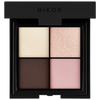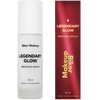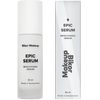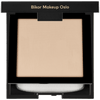But Elizabeth was not just an artist. She was a woman who loved beauty, attention to detail, and had an exceptional talent for make-up. Painting her face became an act of self-expression for her, an art as intimate as tending to the flowers she loved to grow.
Right after arriving, instead of resting, the first thing she decided to do was to plant a garden on Bursztynowa Street. For her, a garden was a symbol of stability and care, a way to put down roots in a new place. In this way, between the colors of the plants and the rustle of leaves, Elizabeth began to create a new home for herself, one that reminded her of everything she had left behind.
Statement by Elżbieta Korbutt
Gdansk November 2024
It gave me a lot – independence and passion for creation. For years I had a feeling that somewhere in the world there was a quiet voice that pushed me to act, that guided my hands when I designed, invented, patented. Maybe this voice was the spirit of Gdańsk, my hometown. As a teenager I worked in design offices, immersed in the atmosphere of carefully cultivated visions and blurred plans, absorbing everything that could make me independent.In the 90s, Poland went through rapid changes – anyone could set up a sales register, make things at home, sell them on a simplified account, create paintings or plaster sculptures. In such times, I had the impression that the air was electrified with freedom – even creation became an act of faith in something that was only just beginning to take shape.A good product gave me something that was hard to name – self-confidence, as if the shape of my dreams was reflected in the work I did. People liked me, which was important to me. I aroused sympathy. I had an intuitive ability to see beauty in everyone, even in those who seemed closed to the world. The women who fell into my hands became more beautiful – the more modest and inconspicuous the person was, the more I felt the need to bring out the hidden light in them. This was my faith: I touched their lives, so I had to be tactful and delicate, because when you work with the body, you also touch someone's soul.
I remember once, in Junior, in Warsaw, a man came to me. He wanted to buy a cosmetic, but he said something that hit me like a sudden gust of wind: "Ugly women come here and come out beautiful." It wasn't about the cosmetic as an object, it was about the moment when these women looked at each other differently. It was like a silent spell that was delicately reflected in their gazes.
In 1995, in the dynamically developing SUKCES Shopping Center in Gdańsk, I opened my first salon. It was the culmination of years of work, bold dreams, and my unwavering determination. That day, I felt as if time slowed down and the entire world fell silent for a moment. I entered a space that was more than just a place of work – it was a land where I could give people something they themselves did not always see.
And I remember 2004, when Małgorzata Wedekind opened another salon in the Manhattan Shopping Center. It was almost a repetition of the same ritual. Manhattan attracted people in the same way that the idea of creating one's own destiny attracts them - an elegant space, reflecting vision and care. What happened at these openings had an invisible, deeper meaning. It was as if we were all searching for a way back to the same quiet, inner harmony that is found in the moments when someone looks at themselves for the first time as someone beautiful, worthy of attention.
Through this work, through creation, I was able to give something that was more ephemeral than a product. I was giving the opportunity to see ourselves anew – to look in the mirror and see ourselves as perhaps only those who can really see can see us.



























































